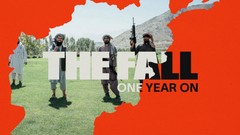Zabi (right) was just 17 when he fell to his death from a departing U.S. transport plane. His brother, Zaki (left) hasn’t been seen since that day. Photo supplied.
Rezayee (pictured with one of his children) is struggling to keep his family alive while grieving the crushing loss of his two sons. Photo supplied.
It remains unclear exactly how many people plummeted to their deaths during those first few days of the U.S.’ botched evacuation. Former Afghan health officials claimed their numbers became almost impossible to confirm amid the turmoil. In some cases, they added, victims’ bodies were so badly damaged from the fall that they were difficult to identify.“Everything was in the control of the U.S. forces and they could have evacuated in a way that no one would be harmed… They knew that if they fly these people would be killed, but they still took off knowing this.”
Footage from the day of Zabi's death and Zaki's disappearance showed figures falling from an airborne U.S. transport plane, moments after it was swarmed by desperate Afghans on the runway. Photo: MARCUS YAM / LOS ANGELES TIMES via Getty Images
This is unlikely to happen. Dr Binoy Kampmark, senior lecturer at the Australian RMIT University’s School of Global, Urban and Social Studies and an expert in international security and diplomacy, said that it is standard fare for the “washing hands principle” to come into play after a great military power withdraws from a country.Kampmark cites Vietnam as just one spot on the U.S. military’s “historical record of being involved in foreign theatres, but then leaving having committed an assortment of offences, misdemeanours, and crimes and not necessarily compensating for them.”“I can’t even describe how hard it is to lose your sons from one side and to live in poverty and restrictions from the other… Humans can survive without food and clothes, but it is harder than death to carry along the loss and memories of your two sons.”
Armed Taliban members gather near Hamid Karzai International Airport as thousands of Afghans rush to flee Kabul on August 16, 2021. Photo: Haroon Sabawoon/Anadolu Agency via Getty Images.

